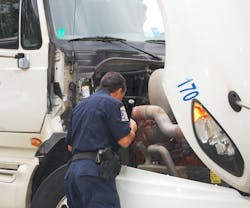If your rig gets inspected in Texas, you are more likely to get a light or lamp violation. And trucks traveling through Indiana are more likely to get speeding violations. In Oregon, truckers get more hours-of-service (HOS) violations and in Louisiana it’s more likely you will get cited for not buckling up.
These are a few of the tales circulating among truckers since the Federal Motor Carrier Safety Administration began its Compliance, Safety, Accountability (CSA) program almost three years ago. The complaints about disparity in CSA enforcement throughout the various states has gone on, but until now, much of this scuttlebutt was purely anecdotal. Now Vigillo’s IQ Lab has created comparative analysis of inspections, violations and crashes for the 48 contiguous United States, drilled down to the county level and normalized by the number of commercial vehicle miles traveled to offer fleets unprecedented detail on CSA violations in various areas of the country.
The safety data mining specialists held a webinar on Tuesday, Sept. 17, to demonstrate Vigillo’s findings and provide examples from its newly released Comprehensive State Enforcement Statistics report.
“Now that we’ve issued our report the interest in this subject of enforcement disparity has been overwhelming,” explained Steven Bryan, founder & CEO of Vigillo. “The beauty of a good webinar is not only can it become an industry-wide forum to discuss issues but we can use it as a very cost effective means to educate our customers, and non-customers, on subjects we believe affect them greatly.”
Experts at Vigillo’s IQ lab and engineers geocoded and extracted data from about 10 million records and plugged in data looking at key highway lanes through the perspective of commercial vehicle miles driven to help focus CSA violation information.
“We have scoured the FHWA website — it’s not straightforward and there is some estimation going on — but we think it’s pretty good and we think for the first time we have state-by-state commercial vehicle miles data that can be applied to normalize some of the CSA data,” Bryan said.
Analyzing the data, he said, researchers were able to find many interesting trends in CSA enforcement.
For example, he said, Arizona as a state appears to be “off the charts” when it comes to writing up violations for non-English speaking drivers. However, if you peel back the data and look at it broken down by county you discover that most of those violations are written in Santa Cruz County. “If not for that one county, Arizona would be about the same as elsewhere in country.”
In Iowa, Bryan says, there are more HOS violations written. But it’s not really a statewide issue. “There’s a large skew in hours-of-service violations in counties along the I-80 corridor compared to other counties in the state.”
And Maryland has a reputation for writing up CSA maintenance violations for tires. But it’s really only one county where tire violations are so prolific and inspectors there write more than double the tire violations than their nearest neighboring county.
Vigillo’s data also shows interesting trends from a traffic lane perspective. Along the I-5 corridor on the west coast, Oregon is notorious for writing more HOS violations, even more than California, a state with 10 times Oregon’s population. Bryan says that while it’s true that Oregon writes more HOS violations, if you break the data down by traffic lanes and counties you find that there are really only two large hotspot areas near Portland and Medford. Elsewhere in the state, the numbers are more in line with other areas of the country.
Bryan pointed to Indiana as an example of how the data can also be used to show that enforcement is uniform throughout a particular state. Indiana is notorious for writing speeding violations, and the data backs that reputation up, Bryan said. “Indiana has a reputation for giving truckers speeding violations, and it’s easily double that of most other states.”
But the enforcement of speed laws is balanced equally throughout the entire state. “Indiana should be commended for their focus on the speeding problem and for their equality in enforcement throughout the state,” Bryan added.
In many states, enforcement can vary wildly from county to county, but researchers found an interesting phenomenon tracking data along I-75 through Kentucky, Tennessee and Georgia.
“When you look at county blobs along this route you see some symmetry in CSA points,” Bryan said. He speculated that perhaps enforcement personnel in these states communicate better with each other. “The symmetry we see in violations along this particular lane is the type of balance we need throughout the entire CSA system.
“We as an industry can’t impact what enforcement does,” Bryan concluded. “I think it will be a long time if ever before we achieve the balance we all wish would be the case in CSA enforcement. Until then it’s absolutely critical that you know where this disparity exists and be able to communicate this out to your drivers, to your internal stakeholders and to your customers.”
To purchase the Comprehensive State Enforcement Statistics Report go to http://vigillo.com/solutions/iq-lab/.
